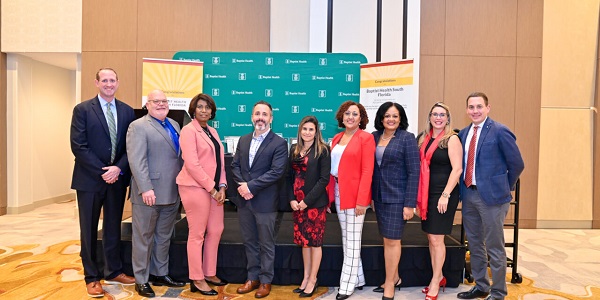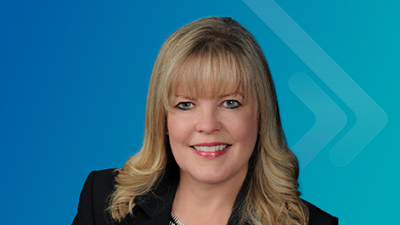Baptist Health South Florida celebrated systemwide adoption of an innovative, digital resuscitation education solution to help improve cardiac arrest survival. The system is leveraging the Resuscitation Quality Improvement® Program (RQI®), co-developed by the American Heart Association® and Laerdal Medical, to verify CPR competence and elevate the delivery of high-quality CPR in cardiac arrest emergencies.
Baptist Health South Florida first introduced the RQI program, an innovative, digital CPR learning solution, as part of a pilot test at West Kendall Baptist Hospital in July 2018. Transitioning from traditional instructor-led CPR training and initially enrolling nearly 800 clinicians, now, the system’s 11 hospitals and one outpatient entity have embraced RQI to help its more than 12,000 healthcare providers achieve sustained mastery of high-quality CPR skills and competence, resulting in improved patient outcomes.
“We are excited to implement this proven solution across the Baptist Health South Florida system,” said Dr. Agueda Hernandez, Baptist Health South Florida’s vice president of medical education and chief health equity officer. “Patients who suffer a cardiac arrest must receive the highest quality CPR possible, which is known to be the cornerstone for survival. Our significant improvement in CPR performance, about 21%, can be directly attributed to our clinicians’ participation in the RQI program. Additionally, we are realizing cost and productivity efficiencies, and increased confidence in our providers’ response time. RQI has helped Baptist Health Florida embrace a culture of resuscitation competence and uphold its commitment to quality, clinical and service excellence.”
More than 209,000 in-hospital cardiac arrests occur annually in the U.S. with survival rates at about 26% from adult in-hospital cardiac arrest. For decades, the CPR training standard for healthcare providers has been Basic Life Support with a requirement for participants to renew their course completion card every two years. However, studies show CPR skills can decay within three to six months following this training.
RQI is self-directed, simulation-based mastery learning and performance provided through cognitive and hands-on CPR quality improvement sessions that measure and verify competence. The program employs a “low-dose, high-frequency” model requiring healthcare providers to complete course assignments in short sessions every quarter. In 2018, the American Heart Association, the world’s leading voluntary organization dedicated to a world of longer, healthier lives for all, and Laerdal Medical, one of the world leaders in medical simulation and resuscitation training, called for a new standard of care by shifting resuscitation practice from training once every two years to verified CPR competence for healthcare professionals.
Baptist Health South Florida has nearly 90 RQI simulation stations deployed throughout the hospitals to deliver Basic Life Support, Advanced Life Support and Pediatric Advanced Life Support course instruction, affording learners with greater flexibility and 24/7 access to resuscitation education.
“Enrollment in the RQI program illustrates Baptist Health South Florida’s commitment to making high-quality CPR a priority across the organization and furthering our shared mission to improve patient care and help save more lives,” said Brian Eigel, chief executive officer at RQI Partners, the partnership between and service provider for the American Heart Association and Laerdal Medical. “This path to a new standard of resuscitation care exemplifies the system’s leadership to ensure its providers have the knowledge and skills to perform lifesaving interventions on every patient, every time.”
In a special ceremony on November 29, attended by Baptist Health South Florida, American Heart Association and RQI Partners’ staff members, Eigel and Russell Griffin, RQI Partners’ senior vice president of programs and marketing, recognized Baptist Health South Florida’s leadership and commitment to improving patient outcomes, designating the system an RQI Lighthouse Organization. The system joins an exclusive group of hospitals from around the country that demonstrate resuscitation, quality improvement and patient care best practices using the RQI program.
This distinction is awarded to participating RQI hospitals that advocate for quality and a culture of resuscitation excellence and serve as a beacon to other organizations looking to improve their resuscitation programs and patient outcomes. With a reputation for superior quality and efficient processes, RQI Lighthouse Organizations align with the RQI mission to eliminate preventable death from sudden cardiac arrest.
“We enthusiastically welcome Baptist Health South Florida to our RQI Lighthouse Organization roster, which now totals 19 institutions,” Griffin noted. “The system serves as a stellar role model on how to pivot from the CPR learning status quo to incorporating the RQI program into its culture. CPR performance has improved, and clinicians’ confidence levels continue to climb. Staff members are having peer-to-peer conversations to help influence and expand program adoption and offering feedback on how we can continue to enhance the RQI program. We are proud to bestow Lighthouse distinction upon Baptist Health South Florida and look forward to collaborating with its team to ensure RQI is thriving in the greater South Florida community.”



























